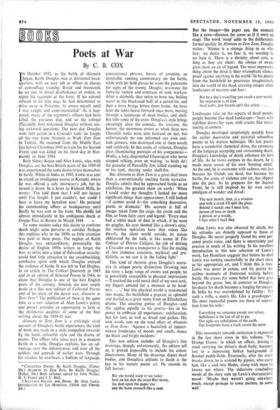D I N October 1942, as the battle of Alamein began,
Keith Douglas was at divisional head- quarters, with an easy job as officer in charge of camouflage training. Bored and frustrated, he set out, in direct disobedience of orders, to rejoin his regiment at the front. If his colonel refused to let him stay, he had determined to drive away to Palestine, `to amuse myself until I was caught and court-martialled.' As it hap- pened, many of the regiment's officers had been killed the previous day, and so the colonel (Piccadilly Jim) welcomed Douglas without ask- ing awkward questions. The next day Douglas went into action in a Crusader tank; he fought all the way from Alamein to Wadi Zem Zem in Tunisia. He returned from the Middle East just before Christmas 1943 to train for the Second Front, and was killed on his third day in Nor- mandy in June 1944.
Both Sidney Keyes and Alun Lewis, who, with Douglas, are the best British poets of the 1939-45 war, experienced the same desire to test themselves in battle. While in India in 1943, Lewis was sent to attend an intelligence course at Karachi, where he was offered a safe instructor's job, but he turned it down. In a letter to Richard Mills, he wrote: 'I've told them that I will not lecture until I've fought. I just couldn't; nor could I bear to leave my battalion now.' He pestered his commanding officer at headquarters until finally he was sent to the front. His choile led almost immediately to his ambiguous death at
Poets at War
By C. B. COX
conventional phrases, bursts of emotion, an inimitable running commentary on the battle, while with his field-glasses be scans the panorama for signs of the enemy. Douglas re-creates the fantastic variety and contrasts of tank warfare. After a skirmish, they retire to brew tea, boiling water in the blackened half of a petrol-tin, and then a lorry brings letters from home. An hour later the tanks heave forward once more, moving through a landscape of dead bodies, and shell- fire kills some of the crew. Douglas's style brings amazingly alive the comedy, the tensions, the horror; the enormous errors as when three new Churchill tanks were sent forward on test, but unfortunately no one informed our own anti- tank gunners, who destroyed one of them neatly and ruthlessly. In this arena of violence, Douglas gives illuminating portraits of his companions- Mudie, a lazy, disgruntled Glaswegian who never stopped talking, even on waking, 'as birds do'; the panache of Piccadilly Jim, killed standing up in his tank, shaving under shell-fire.
But Alamein to Zem Zem is a great deal more than a conventionally exciting battle narrative. Douglas admits that he approached battle as an exhibition, the greatest show on earth : 'When I could order my thoughts I looked for more significant things than appearances; I still looked —I cannot avoid it—for something decorative, poetic or dramatic.' His account is full of images taken from the stage, the circus and the film, or from fairy story and legend : 'Every man had a white mask of dust in which, if he wore no goggles, his eyes showed like a clown's eyes,' the wireless operators have thin voices like dwarfs, the silent world outside, its noises obliterated by the tank, is like scenes in The Cabinet of Doctor Caligari, the job of driving a Crusader on to a transporter is 'like the mating of two immense creatures, mythical and pre- historic, as we saw it in the fading light.'
This kind of rhetoric gives Douglas's narra- tive its unique poetic distinction. Drawing into his story a large range of events and people, he is powerfully susceptible to physical impressions touched the cold metal shell of my own tank, my fingers amazed for a moment at its hard- ness . . .,' but this physical world is transmuted into magic, the battlefield a pageant as splendid and fearful as a great scene from an Elizabethan drama. The amazing genius of Douglas—and this applies equally to his poetry—lies in his power to embrace all experiences : exhilaration, lust for loot, as well as dread and pathos. His own words sum up the total effect of Alamein to Zem Zem: 'Against a backcloth of indeter- minate landscapes of moods and smells, dance the black and bright incidents.'






























 Previous page
Previous page